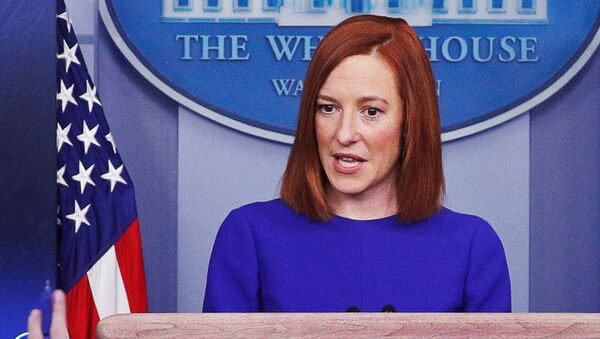White House Press Secretary Jen Psaki told reporters on Friday that the Biden administration would work closely with regional partners to "deter" the Democratic People's Republic of Korea (DPRK).
“As we have historically, the United States will work closely with partners in the region to determine on path forward and work together on deterrence,” Psaki said. “We obviously have a vital interest in deterring North Korea."
Those partners include Japan and the Republic of Korea, also called South Korea.
Biden is likely to continue using Trump's favored tool of diplomatic coercion - economic sanctions - against US adversaries, including the DPRK, according to a Reuters report last month.
Biden Approach Differs From Trump
During the 2020 presidential election campaign, Biden sought to distance himself from then-US President Donald Trump's rapprochement with DPRK leader Kim Jong Un, whom Trump met for several summits aimed at convincing the socialist state to give up its nuclear weapons program in exchange for lowering some of those sanctions. In the end, Trump was unwilling to give some sanctions relief in exchange for demolition of some nuclear test facilities, and the talks fell apart.
During a televised debate with Trump in October 2020, Biden compared Kim to German fascist dictator Adolf Hitler. He said he would only agree to meet if Kim agreed beforehand to reduce his country's nuclear arsenal. The country tested its first nuclear device in 2006 and is believed to have less than 40 nuclear warheads. It is not known if they have sufficiently miniaturized any of those warheads to fit them on an intercontinental ballistic missile (ICBM).
Previously, in November 2019, Biden sharply criticized Trump's policy after the DPRK tested two short-range missiles, calling the policy "a string of spectacular diplomatic failures" and attacking Kim as a "murderous dictator." He said Trump was wrong to treat Kim as an equal at the summits in Hanoi, Vietnam, and in Singapore.
In response, the DPRK's Ministry of Foreign Affairs called Biden "bereft of elementary quality as a human being" and accused him of being "greedy for power" in a scathing statement published by the state-owned Korea Central News Agency (KCNA).
"Rabid dogs like Biden can hurt lots of people if they are allowed to run out of control. They must be beaten to death with a stick, before it is too late," the ministry statement added. "Doing so will be beneficial also for the US."
An Armed Standoff
At a military parade in the capital of Pyongyang last week, the Korean People's Army showed off its vast array of missiles, including a submarine-launched ballistic missile previously unknown to Western observers. Another large ICBM appeared in an October 2020 parade. However, no test of such a rocket has been performed by the DPRK since it adopted a unilateral testing freeze in 2017.
The US remains technically at war with the DPRK, as the 1950-53 Korean War only ended in a ceasefire, not a permanent peace treaty. The war killed an estimated three million people, the vast majority of them Koreans. The ceasefire established a demilitarized zone separating North and South Korea, and the US has maintained a garrison of forces in the South to deter a potential invasion by the North.
In 2018, the two Koreas signed an end-of-war declaration as part of their own historic rapprochement, but further moves toward peace fell apart amid US objections, and relations have considerably cooled between Seoul and Pyongyang. However, late last year, South Korean President Moon Jae In, who signed the 2018 deal with Kim, pressured the United Nations and the United States to help bring an end to the 70-year-long conflict with their own end-of-war declaration.




